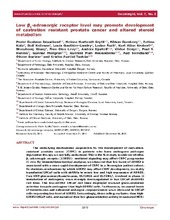| dc.contributor.author | Braadland, Peder | en_US |
| dc.contributor.author | Grytli, Helene Hartvedt | en_US |
| dc.contributor.author | Ramberg, Håkon Andre | en_US |
| dc.contributor.author | Katz, Betina | en_US |
| dc.contributor.author | Kellmann, Ralf | en_US |
| dc.contributor.author | Gauthier-Landry, louis | en_US |
| dc.contributor.author | Fazli, Ladan | en_US |
| dc.contributor.author | Krobert, Kurt Allen | en_US |
| dc.contributor.author | Wang, Wanzhong | en_US |
| dc.contributor.author | Levy, Finn Olav | en_US |
| dc.contributor.author | Bjartell, Anders | en_US |
| dc.contributor.author | Berge, Viktor | en_US |
| dc.contributor.author | Rennie, Paul S. | en_US |
| dc.contributor.author | Mellgren, Gunnar | en_US |
| dc.contributor.author | Mælandsmo, Gunhild | en_US |
| dc.contributor.author | Svindland, Aud | en_US |
| dc.contributor.author | Barbier, Olivier | en_US |
| dc.contributor.author | Tasken, Kristin Austlid | en_US |
| dc.date.accessioned | 2016-09-05T09:35:29Z | |
| dc.date.available | 2016-09-05T09:35:29Z | |
| dc.date.issued | 2016-12-04 | |
| dc.Published | OncoTarget 2016, 7(2):1878-1894 | eng |
| dc.identifier.issn | 1949-2553 | |
| dc.identifier.uri | https://hdl.handle.net/1956/12722 | |
| dc.description.abstract | The underlying mechanisms responsible for the development of castration-resistant prostate cancer (CRPC) in patients who have undergone androgen deprivation therapy are not fully understood. This is the first study to address whether β2-adrenergic receptor (ADRB2)- mediated signaling may affect CRPC progression in vivo. By immunohistochemical analyses, we observed that low levels of ADRB2 is associated with a more rapid development of CRPC in a Norwegian patient cohort. To elucidate mechanisms by which ADRB2 may affect CRPC development, we stably transfected LNCaP cells with shRNAs to mimic low and high expression of ADRB2. Two UDP-glucuronosyltransferases, UGT2B15 and UGT2B17, involved in phase II metabolism of androgens, were strongly downregulated in two LNCaP shADRB2 cell lines. The low-ADRB2 LNCaP cell lines displayed lowered glucuronidation activities towards androgens than high-ADRB2 cells. Furthermore, increased levels of testosterone and enhanced androgen responsiveness were observed in LNCaP cells expressing low level of ADRB2. Interestingly, these cells grew faster than high-ADRB2 LNCaP cells, and sustained their low glucuronidation activity in castrated NOD/SCID mice. ADRB2 immunohistochemical staining intensity correlated with UGT2B15 staining intensity in independent TMA studies and with UGT2B17 in one TMA study. Similar to ADRB2, we show that low levels of UGT2B15 are associated with a more rapid CRPC progression. We propose a novel mechanism by which ADRB2 may affect the development of CRPC through downregulation of UGT2B15 and UGT2B17. | en_US |
| dc.language.iso | eng | eng |
| dc.publisher | Impact Journals | eng |
| dc.rights | Attribution CC BY | eng |
| dc.rights.uri | http://creativecommons.org/licenses/by/3.0/ | eng |
| dc.subject | β2-adrenergic receptor | eng |
| dc.subject | ADRB2 | eng |
| dc.subject | CRPC | eng |
| dc.subject | UGT2B15 | eng |
| dc.subject | UGT2B17 | eng |
| dc.title | Low β2-adrenergic receptor level may promote development of castration resistant prostate cancer and altered steroid metabolism | en_US |
| dc.type | Peer reviewed | |
| dc.type | Journal article | |
| dc.date.updated | 2016-08-16T11:15:52Z | |
| dc.description.version | publishedVersion | en_US |
| dc.rights.holder | Copyright 2016 Impact Journals, LLC | |
| dc.identifier.doi | https://doi.org/10.18632/oncotarget.6479 | |
| dc.identifier.cristin | 1307079 | |
| dc.relation.project | Stiftelsen Kristian Gerhard Jebsen: SKGJ-MED-005 | |

